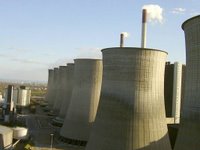
Here's a way reduce your personal CO2 emissions, get your Carbon Clear offset package at no additional cost, and get a free lunch.
Work from home just one day a month. That's it; no tricks, no gimmicks.Here's the deal: Explain to your boss (or yourself if you're the boss) that you need to work at home once a month to finish up that important project without constant interruption. (Remember to actually do the office work and not the house-keeping.)
If you normally drive to work every day, keeping the car parked one day each month will save around £43 in petrol, and cut your driving related CO2 emissions by over 100kg! That's enough to purchase a medium car offset to cancel out the rest of your driving emissions - and have enough left for a nice lunch. If you can talk your boss into letting you work from home twice a month, that's more CO2 saved, and more free lunches.What if you don't drive? If you live in London and pay £3 a day on the Tube, working from home once a month will save you £36. That's enough to offset that winter holiday flight to Southeast Asia you've been planning - and get that free lunch.
Remember, reduce what you can and offset the rest to keep us all moving towards a low carbon future.
And enjoy lunch.
(*Well, you save more than you pay.)


